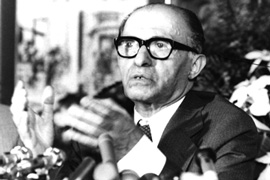Peace still eludes the Middle East
Thirty years after Egypt and Israel signed a treaty, the region is yet to benefit.

 |
| Many believed an Egypt-Israel treaty would eventually include other Arab states [GALLO/GETTY] |
On March 26, 1979, Anwar Sadat, the Egyptian president, Jimmy Carter, his US counterpart, and Menachem Begin, the Israeli prime minister, ended 30 years of war and signed a peace treaty that would become an iconic moment in the history of the Middle East.
It was the first time an Arab nation had agreed to establish diplomatic relations with the Jewish state.
Hoda Zaki, an Egyptian professor of English who moved to the US a few years after the signing of the treaty, remembers the handshake as a “genuine gesture of good will.”
“You felt they wanted peace, and you could tell through that handshake there existed a real chance for peace,” she said.
However, 30 years after the signing ceremony on the White House lawn, there are fears that a comprehensive Middle East peace deal is becoming increasingly elusive.
“But if you ask me if the treaty was everlasting for the region, I’m not sure,” Zaki said.
Forging peace
| In depth |
|
|
In 1977, Sadat made a surprise visit to Tel Aviv where he addressed the Knesset and outlined how Israel and Egypt, which had fought wars in 1948, 1956, and 1967, could forge a lasting peace in the region.
His trip made him the first Arab leader to visit Israel and in a bold move proposed peace to the former enemy which at that time was still occupying the Sinai Peninsula.
It was during the 1973 Yom Kippur War that Sadat had become convinced that perpetual conflict with Israel would ultimately destroy Egypt.
In the opening days of the conflict, Egyptian infantry made considerable gains against the Israeli army, but as US military support poured into Tel Aviv, the tide of war dramatically shifted.
Ibrahim Oweiss, who was appointed by Sadat as the first under-secretary for economic affairs in 1977, told Al Jazeera: “There were many of us in the government who opposed the deal and never believed he would go through with it.”
“But eventually I saw that Sadat’s peace initiative was a rational and strategic decision. Sadat was looking ahead to the future and realised that without a peace treaty Egypt would suffer in the years to come.”
“Israel couldn’t dismiss the chance of forging a better relationship with Egypt because of our influence in the region. Conversely, Sadat also knew that we could not afford a continued state of war with Israel,” Oweiss said.
Paul Scham, executive director of the institute for Israeli studies at the University of Maryland, says Israel believed Sadat’s initiative would mark the beginning of the end of the Arab-Israeli conflict.
“Israelis, at that time, saw Egypt as being the most important enemy … the fact that Egypt was willing to recognise and accept Israel, they hoped that this would begin the process of ending that,” he said.
“I was in Israel at the time in fact when the treaty was signed and there was such a sense of disbelief mixed with hope that this was starting the process,” Scham told Al Jazeera.
Opposition and polarisation
 |
| Begin gave up the Sinai in exchange for Egypt’s recognition of Israel [GETTY] |
However, Egypt’s Arab allies labelled Sadat a traitor.
Oweiss says Muammar Gaddafi, the Libyan leader, and Saddam Hussein, the then Iraqi vice-president, were staunch supporters of Egypt’s 1979 punitive expulsion from the Arab League because they sought to take over Cairo’s role as the most influential player in regional politics.
The Arab League headquarters were moved from Cairo to Tunis, and Egypt would not be re-admitted until 1989.
Sadat was assassinated in October 1981 by members of Islamic Jihad who had violently opposed peace with Israel.
But Egypt’s absence from the 22-member Arab League may have been more damaging to the chances of reaching a comprehensive peace deal.
Ali Younes, an Arab-American political analyst based in Washington DC, told Al Jazeera: “Once Egypt was taken out of the Arab fold, it enabled Israel to be more adventurous and meddle in Arab world affairs. While Egypt’s hands stayed tied behind its back, Israel became stronger.”
Younes believes Israel was emboldened by Egypt’s alienation in the Arab World to launch the 1982 invasion of Lebanon.
Conflicts increase
 |
| Sadat was labelled a traitor and kicked out of the Arab League after the treaty [GETTY] |
In the 30 years since the signing of the Egypt-Israel Peace Treaty, Tel Aviv has launched several aggressive campaigns against its Arab neighbours.
In June 1981, Israeli fighter bombers destroyed the al-Tammuz (Osirak) nuclear reactor south of Baghdad, Iraq and in 1982 Israel invaded Lebanon to rout the Palestinian Liberation Organisation that had become headquartered in Beirut.
The invasion resulted in later UN-documented atrocities such as the Sabra and Shatila massacre in which several thousand Palestinian civilians were killed by Lebanese phalangist militia allied with Israel. Israel would not withdraw from Lebanon until 2000.
“I think there was a disconnect on the Israeli side between their understanding of peace with Egypt and how to deal with other Arab states,” Scham said.
“When the invasion of Lebanon started, Israelis were puzzled why their relations with Egypt went into a deep-freeze. They did not understand that despite Arab embassies being withdrawn from Cairo, Egypt still maintained a strong Arab solidarity with its neighbours.”
Scham says the Israelis expected Egypt to abide by its diplomatic treaties and did not realise how untenable Cairo’s position had become. Ultimately, the Egyptian government maintained its diplomatic ties with Israel but the relationship deteriorated.
“In a sense, the treaty never really recovered,” he said.
Oweiss, however, believes treaties between Egypt and Israel would always be undermined because of the latter’s “unwillingness” to sign a comprehensive peace deal.
“From day one, Israel wanted to expand and take more land, [but] it’s really theft by all accounts,” he said.
Setbacks
 |
| Oweiss: The treaty became one between governments and not their peoples |
The Israeli war on Lebanon in 2006 and the January 2009 offensive in Gaza further damaged the Egypt-Israeli treaty and set back prospects for comprehensive peace even further.
The Gaza death toll – more than 1400 killed, most of them civilians – angered Arabs in the Middle East and led to protests in Egypt where opposition groups, such as the Muslim Brotherhood, demanded the Israeli ambassador be expelled and diplomatic ties be suspended.
Oweiss said Israel had never been able to win over the Egyptian street; the Gaza campaign only proved that the peace treaty was one between governments and not their peoples.
“The main reason for this is that the people of Egypt are very much affected by what is going on in Israel with its continued occupation of Palestinian land, it’s repressive regimes, with the many wars ever since the treaty was signed with Egypt, Israel launched a war against Lebanon, several times, and against Gaza,” he said.
“So the Egyptian people are either against dealing with Israel or they are cool about it, they are not enthusiastic about it, and therefore there are very few delegations from Egypt to Israel,” he added.
There are also regional fears that Israeli political power may have become more conservative after the elections win of Benyamin Netanyahu, leader of the right-wing Likud party.
Netanyahu has already formed a coalition including the centrist Labour party as well as the Yisrael Beitenu and the Shas, two ultra right-wing parties known for their hawkish, anti-Arab line on domestic and security policies.
Avidgor Lieberman
Under the terms of the coalition, Avigdor Lieberman, the leader of Yisrael Beitenu, is expected to become Israel’s foreign minister, a move which has raised concerns that Israeli ties with the international community could be harmed.
Lieberman has been accused of racism because of his plans to seek loyalty oaths from Palestinian-Israelis wanting citizenship in Israel.
“Lieberman, has threatened to even bomb the Aswan Hydroelectric Dam if there is a new war; this is the kind of person who will represent Israel in the future,” Oweiss said.
“He is a very staunch advocate of having a Zionist, racist country whereby even the Israeli Arabs that live there could be removed by his doing.”
“If they take Lieberman as their next FM, this would reduce Egyptian Israeli peace to nil. If Egypt finds [it is] in its interest only to keep the treaty functional on paper, that’s what will remain, but not really an effective peace,” Oweiss said.
No effect
But Gideon Levy, a journalist with Haaretz, an Israeli daily newspaper, disagrees.
“I don’t think that either the existing peace treaty with Egypt or the prospects of having a comprehensive peace deal in the Middle East could be affected by the new administration,” he said.
“The peace deal with Egypt has already endured so much that it’s proved to overcome all kinds of tests. With or without Netanyahu and his new cabinet, it won’t make a difference.”
Levy said that the only difference between Netanyahu’s cabinet and its predecessor lies in rhetoric and semantics.
“As long as the Israeli occupation in Palestine continues, the situation will stay just like it was when [Ehud] Olmert, who is a man of peace, was around,” he said.
Scham also think Netanyahu’s government will not hinder the peace treaty.
“I think it will make future peace negotiations more difficult but there has been this swing back and forth since the beginning so Egypt is not going to go back onto a war footing, Clearly, it will be more difficult for them to deal with Israel but they know they have to.”
On March 25, Netanyahu said that peace was a “common and enduring goal for all Israelis and Israeli governments, mine included”.
“This means I will negotiate with the Palestinian Authority for peace.”

 Sadat’s peace gambit
Sadat’s peace gambit